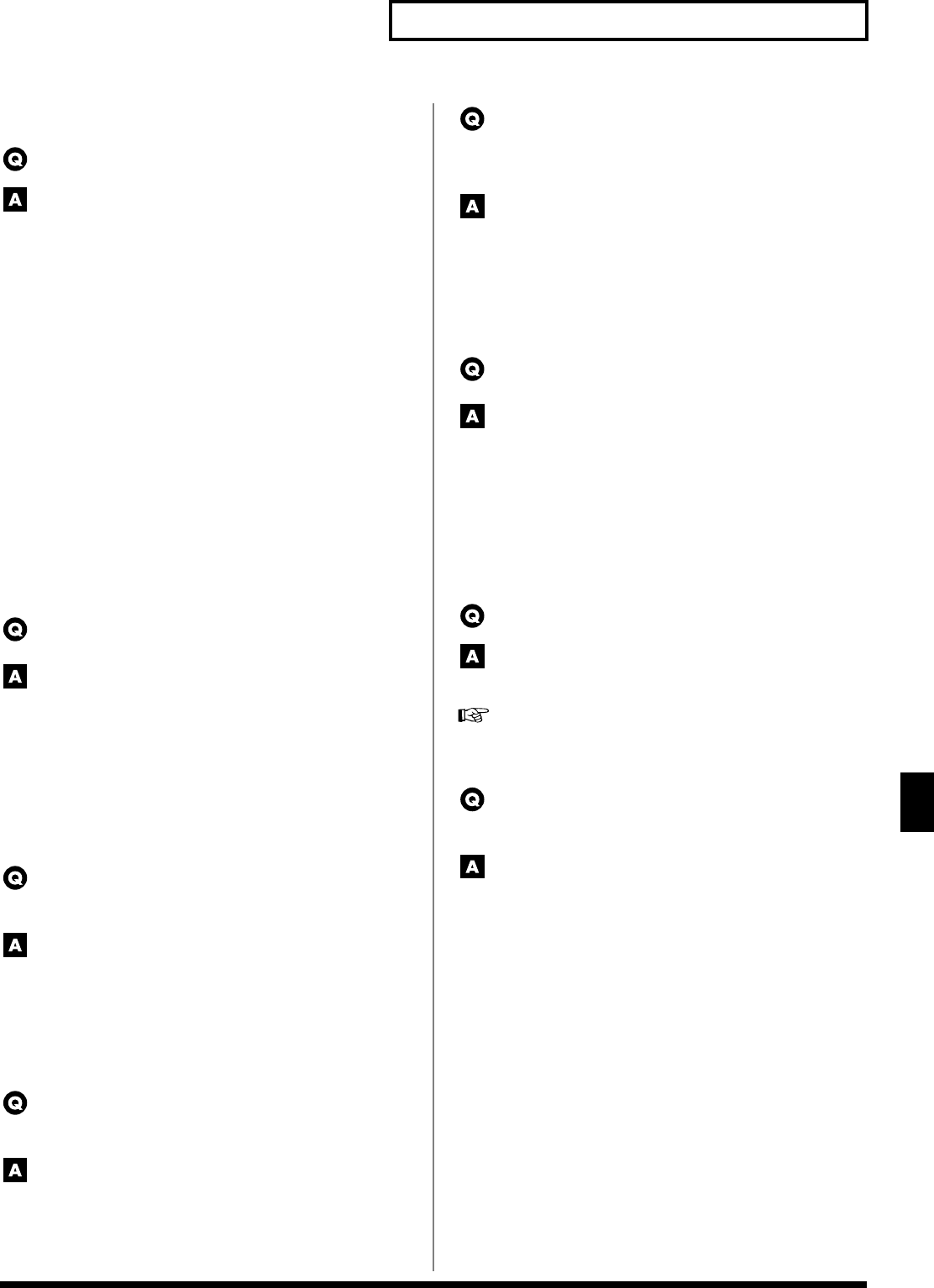
213
Troubleshooting
Troubleshooting
Issues Related to Effects
Effects not applied.
Check the following points.
• The “MFX,” “CHO,” “REV” or “MASTER” effect switches
located in the upper part of the PLAY screen may have been
turned off.
Press [EFFECTS]/[8 (Effect Sw)] to turn them on.
• Are the various effect settings correct? (p. 175)
• If the send level of each effect is set to 0, the effect will not be
applied. Check the settings.
• Even with send levels to each effect set at 0, effects are not
applied if the Multi-effects Output Level, the Chorus Level, or
the Reverb Level is set to 0. Check each setting.
• If Output Assign is set to other than “MFX,” the Multi-effects
sound will not be output.
• If Output Assign is set to “PATCH” for each Part of the
Performance, the sound will be output according to the
Output Assign settings of the Patch (for each Tone) which is
assigned to those Parts. This means that if Output Assign for
the Patch (each Tone) is set to other than “MFX,” the Multi-
effects sound will not be output.
The Modulation or other controller is always
on.
Check the Matrix Controller settings. (p. 61)
The Fantom-S allows you to use the Matrix Control to control
Patches in real time. The Matrix Control functions as the control
source for the Control Change and other MIDI messages received by
the Fantom-S, and makes changes to the various Patch parameters
based on these messages.
Depending on these settings, the Fantom-S may be responding to
MIDI messages sent from external MIDI devices, and may result the
Patches sounding different than intended.
Raising the chorus or reverb send level for
each part of a performance still does not cause
the effect to be applied sufficiently.
Although you can make Send level settings to the Chorus and
Reverb for each individual Part in a Performance, these values
only set the upper limit of the Chorus and Reverb Send levels for the
Patch used. Accordingly, even when the value is set to the maximum of
127, if the Send level is lowered in the Patch being used, there will be no
effect. In addition, different Patch Chorus and Reverb Send level settings
can be used according to whether or not the multi-effects are used.
Using the Matrix Control or other such means
to control the LFO results in noise when the
Pan is changed suddenly.
Lower the change in speed (LFO Rate).
Due to the specialized processing used for the Pan, which
alters the volume level in each of the left and right sides, sudden Pan
movements causing rapid changes in these levels creates large
changes in volume, and noise from this may be audible as a result.
Multi-effect 43: TAP DELAY or other delay time
value is set to the note, and then the tempo is
slowed down, does the delay time not change
beyond a fixed length?
Such Delay time settings have an upper limit, so if the upper
limit of a value set to the note is exceeded when the tempo is
retarded, that upper value cannot rise any further. The upper time
limit for each is the maximum value that can be set other than the
numerical value for the beat.
Issues Related to Saving Data
The Performance sounds different than when it
was written.
If you have modified the settings of a patch used by a
performance, or if the temporary patch of the performance has
been modified by an external MIDI device, these patches must also
be saved.
If patches used by a performance have been edited when you write
that performance, the Fantom-S will display a message asking
whether you want to discard these patches. In such cases, first save
the patch (p. 42) or rhythm set (p. 66), and then save the performance
(p. 96) again.
Patches sound different than when written.
The write operation cannot be used to save Patches as
changed in Patch mode using Control Change messages from
an external MIDI device.
Refer to
“MIDI Implementation”
(Sound /Parameter List) for
more on the Control Change messages that are received.
The Arpeggio and D Beam controller settings
in the Performance are different than those for
the Patch.
Since the Fantom-S stores arpeggio and D Beam controller
settings for each performance, it will operate according to the
arpeggio and D Beam controller settings that were specified for each
performance.
Reference_e.book 213 ページ 2003年7月14日 月曜日 午後3時25分


















